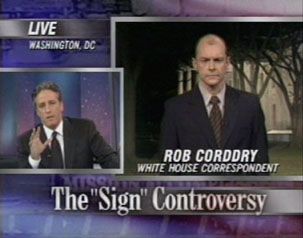An interesting Newsweek feature explaining how Dick Cheney bought into the Shrub War and then proceeded to sell it to everyone else.
Of particular interest is the quote below where Cheney says that “we believe that he [Saddam Hussein] has in fact reconstituted nuclear weapons” and then Newsweek clarifies that “Cheney later said that he meant “program,” not “weapons.”
However, in Donald Rumsfeld’s Meet The Press Interview, Rumsfeld claims that “they [Iraq] had programs relating to nuclear weapons that they were reconstituting. Not that they had nuclear weapons. No one said that.
So it looks like somebody did say that Saddam had nuclear weapons, and it was Dick Cheney.
Cheney’s Long Path to War
By Mark Hosenball, Michael Isikoff and Evan Thomas (With Tamara Lipper, Richard Wolffe and Roy Gutman) for Newsweek.
Of all the president’s advisers, Cheney has consistently taken the most dire view of the terrorist threat. On Iraq, Bush was the decision maker. But more than any adviser, Cheney was the one to make the case to the president that war against Iraq was an urgent necessity. Beginning in the late summer of 2002, he persistently warned that Saddam was stocking up on chemical and biological weapons, and last March, on the eve of the invasion, he declared that “we believe that he [Saddam Hussein] has in fact reconstituted nuclear weapons.” (Cheney later said that he meant “program,” not “weapons.” He also said, a bit optimistically, “I really do believe that we will be greeted as liberators.”) After seven months, investigators are still looking for that arsenal of WMD.
Cheney has repeatedly suggested that Baghdad has ties to Al Qaeda. He has pointedly refused to rule out suggestions that Iraq was somehow to blame for the 9/11 attacks and may even have played a role in the terrorist bombing of the World Trade Center in 1993. The CIA and FBI, as well as a congressional investigation into the 9/11 attacks, have dismissed this conspiracy theory. Still, as recently as Sept. 14, Cheney continued to leave the door open to Iraqi complicity. He brought up a report–widely discredited by U.S. intelligence officials–that 9/11 hijacker Muhammad Atta had met with an Iraqi intelligence officer in Prague in April 2001. And he described Iraq as “the geographic base of the terrorists who have had us under assault for many years, but most especially on 9/11.” A few days later, a somewhat sheepish President Bush publicly corrected the vice president. There was no evidence, Bush admitted, to suggest that the Iraqis were behind 9/11.








